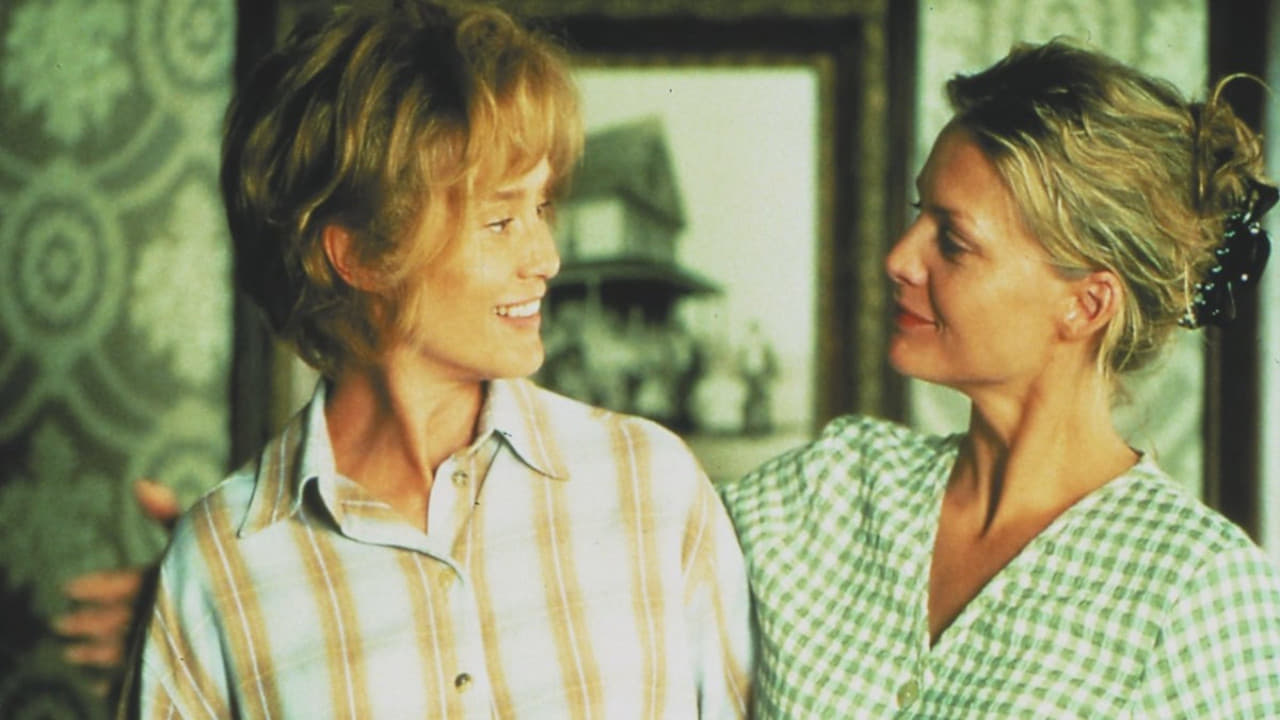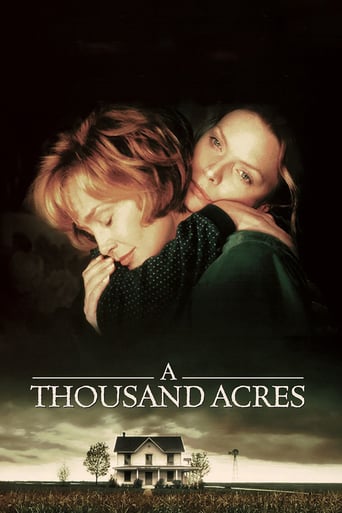

(Note: Over 500 of my movie reviews are now available in my book "Cut to the Chaise Lounge or I Can't Believe I Swallowed the Remote!" Get it at Amazon.)One of the Message Boards threads at IMDb had two women talking about Colin Firth, how they watched the movie only because of him. Obviously these were two young women; but what struck me is how little this movie has been appreciated by audiences generally. The brilliant, and I mean brilliant, performances by Michelle Pfeiffer and Jessica Lange were hardly noticed, not only by audiences, but by the Academy and by most of the critics.I think I know why. First, the plot--or actually just the setup--is a kind of bastardization of Shakespeare's King Lear with the dying, crazy patriarch and the three scheming daughters who will inherit. Their names even begin with the same letters, Regan, Goneril, and Cordelia--Rose, Ginny, and Caroline. And I guess "Larry" (Jason Robards) works for "Lear." The apparent idea envisioned by Jane Smiley in her Pulitzer Prize winning novel was to tell a Lear-like story from the point of view of the daughters, and to tell it a sort of late twentieth century realistic way not considered by the Bard. The problem is, in Smiley and Moorhouse's story, the two older daughters are very human with strengths and weaknesses while the father is a most despicable character without much in the way of redeeming qualities. His only strength was his ability to make a financial success of the farm; however, we can even discount that since his father and grandfather before him built the farm and he inherited it.The second problem--and this is one I cannot personally attest to, not having read Smiley's novel--is that the movie is only a limited and partial interpretation of that novel. Still, it is almost always the case that an excellent novel, especially a long and ambitious one with many psychological nuances, cannot be faithfully transferred to the screen. The vision and audio demands of film drown out the subtleties of a narration while the time constraints don't allow for the full development of character and motivation achieved by the novelist. Given five or six hours, perhaps Moorhouse could have made a movie more in keeping with Smiley's novel.A third problem is one that is perhaps Moorhouse's alone. She began her directing career with the very well done Aussie film Proof (1991) starring Russell Crowe. She follow it up with How to Make an American Quilt (1995) which celebrated women, especially women of a certain age. However it was a bit heavy-handed and clearly and determinedly a chick flick. In a sense A Thousand Acres takes off from there, showing us not only the point of view of women, but does so in a way that may seem politically motivated to some. Larry Cook is clearly a bad, bad daddy. He beat his daughters and he had carnal knowledge of them. He ran the household with an iron fist. Jess (Colin Firth's character) seduces the inexperienced Ginny and breaks her heart for nothing more than a bit of fun it would appear. And then he goes to Rose, who clearly is going to be the power behind the new ownership, and hooks up with her, while incidentally inducing her husband to end his life in a drunken accident. The rest of the men are one-dimensional characters without nuance, the way they often appear in romance novels. I think most audiences were put off by the heavy-handed incest, adultery and sexual betrayal that was woven into the story.Having said all this, I think the critics and the public are wrong. I think the direction was biased against men, but in this story it needed to be. I think Moorhouse did a fine job of making an emotional and engaging film about family dynamics that were none too pretty. And the acting by Pfeiffer and Lange was nothing short of sensational. They seemed to feed off of one another in a way that I found absolutely authentic and deeply moving. In particular Pfeiffer was riveting as she projected her bent-up anger and hatred. The way Moorhouse allowed her character to be revealed to us gradually is a tribute to her ability as a director as well as to Pfeiffer's outstanding performance. And the skill with which Moorhouse guided the change in Ginny's character as she went from a "ninny," as she called herself, to someone with self-awareness and some understandable bitterness, was also excellent. The fact that she left her husband was as much out of shame as anything else. He needed to go get her and forgive her and bring her back. And Robards in his intensity and madness was also very good.I predict that this film, which bombed in theaters, will be better appreciated in the years to come as people see it on DVD. My question is, whatever happened to Moorhouse? Her talent is obvious, but she has yet to director her fourth feature film. When she does I hope she remembers to go with what she believes but to be fair as well. I think, actually she was fair to the two lead character in this film, but didn't pay enough attention to the others. In addition to the unnuanced father, Jennifer Jason Leigh's Caroline was unfinished, leaving us to wonder about why she did some of the things she did. And the husbands needed to be something more than mannequins. They needed to be engaged and involved.
... View MoreI watched this movie, having never read the book, and took the characters at face value, but having already been introduced to them, watched it again recently. I got a whole different viewpoint out of the film.Without the burden of having to focus intently on each character, learning their quirks and foibles, allowed me to focus on the cultural issues laid out in the film. The farm families of Iowa are so intimately inter-related as they are in the area of Indiana where I grew up in the 40's and 50's that I immediately recognized the back-stories and motives behind the characters. Perhaps, Jane Smiley did mean for us to see beyond the superficial into the world these people had to live, but viewers are so caught up in the "Hollywood" aura of the individual actors that they miss a rich layout of a lifestyle that exists less and less as each decade passes. Another film with these characteristics is the "Bridges of Madison County". Try watching both of these films again with an eye to the whole picture.
... View MoreI just watched this movie for the first time after finishing the book last week. What's the problem here? Folks admit that the performances are great--I mean, Lange is stellar!--and that the film is good-looking, but it's got less than a '6'! I don't get it. Come on! The writing's not that bad!Having read a lot of Pulitzer-winning novels, and having seen a lot of the films based on them, I think a better-than-decent job was done in bringing the screenplay together. I thought the paring down of all the dialogue in the novel was executed almost perfectly. This story had a pretty hefty amount of dialogue in it, and the story really came through on the screen despite the fact that only a portion of it was used.**BOOK SPOILER PART** I was, however, a little disappointed in the Ginny-tries-to-kill-Rose subplot's being omitted. I thought that was one of the more emotionally jarring parts of the book, but it was probably a good bet to leave it out. Avid movie-goers, more than avid readers, I think, tend to be less forgiving of protagonists pulling antagonistic stuff. It's apt to confuse Johnny Lunchpail and Joe Sixpack.If you loved the book, you will like the movie. If you hated the book, you will likely hate the movie.********Rog
... View MoreSadly a great opportunity to utilise a superb cast to bring King Lear up to date. However, instead, we got a contrived family drama that appeared to dip into Lear when the writer had run out of ideas, the cast worked hard but it just didn't gel. Recently Stephen Harrigan showed how to adapt and update the classics with his screenplay for the magnificent TV movie "King of Texas".
... View More